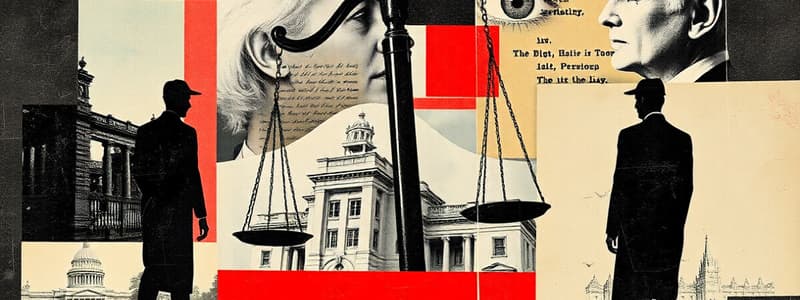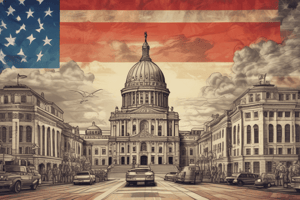Podcast
Questions and Answers
Quel est le rôle principal de l'administration dans l'application des lois?
Quel est le rôle principal de l'administration dans l'application des lois?
- Créer de nouveaux droits pour les citoyens
- Rédiger des documents juridiques complexes
- Contrôler les activités des entreprises privées
- Assurer l'exécution et l'application des lois (correct)
Comment l'administration garantit-elle la paix sociale?
Comment l'administration garantit-elle la paix sociale?
- En exerçant une police administrative pour respecter l'ordre public (correct)
- En créant des lois qui favorisent la liberté d'expression
- En déléguant ses pouvoirs aux acteurs privés
- En imposant des taxes élevées pour financer des projets sociaux
Quel principe n'est pas sous le régime administratif appliqué à l'administration?
Quel principe n'est pas sous le régime administratif appliqué à l'administration?
- Le principe de mutabilité
- Le principe d'égalité
- Le principe de continuité
- Le principe de liberté totale d'organisation (correct)
Quelles entités constituent l'ensemble de l'administration?
Quelles entités constituent l'ensemble de l'administration?
Quelle caractéristique distingue les autorités administratives indépendantes?
Quelle caractéristique distingue les autorités administratives indépendantes?
Quel est le rôle principal du droit administratif ?
Quel est le rôle principal du droit administratif ?
Quelle est une des principales préoccupations liées à l'action administrative ?
Quelle est une des principales préoccupations liées à l'action administrative ?
Quelles sont les deux catégories d'actions juridiques mises en place dans le cadre du droit administratif ?
Quelles sont les deux catégories d'actions juridiques mises en place dans le cadre du droit administratif ?
Selon l'article 20 de la Constitution, que doit faire le gouvernement ?
Selon l'article 20 de la Constitution, que doit faire le gouvernement ?
Quel aspect est souligné concernant le développement de l'administration en France ?
Quel aspect est souligné concernant le développement de l'administration en France ?
Flashcards
Droit Administratif
Droit Administratif
L'ensemble des règles qui définissent l'organisation et le fonctionnement de l'État dans sa relation avec les citoyens.
Action administrative
Action administrative
La mise en œuvre pratique des décisions politiques de l'État.
Pouvoir administratif
Pouvoir administratif
L'autorité conférée à l'État pour assurer le bien commun.
Police administrative
Police administrative
Signup and view all the flashcards
Service public
Service public
Signup and view all the flashcards
Qu'est-ce que l'administration ?
Qu'est-ce que l'administration ?
Signup and view all the flashcards
Quel est le régime juridique de l'administration ?
Quel est le régime juridique de l'administration ?
Signup and view all the flashcards
Quelles sont les fonctions de l'administration ?
Quelles sont les fonctions de l'administration ?
Signup and view all the flashcards
Quels sont les organes consultatifs de l'administration ?
Quels sont les organes consultatifs de l'administration ?
Signup and view all the flashcards
Quelles sont les autorités administratives indépendantes ?
Quelles sont les autorités administratives indépendantes ?
Signup and view all the flashcards
Study Notes
Introduction to Administrative Law
- Administrative law encompasses rules governing the state and citizens, outlining and organizing the services provided by the state.
- It guides state actions but differs from constitutional or international law by focusing on state actions within its system.
- Administrative actions, intended to fulfill national needs such as security, justice, or health, are regulated to prevent abuse of power.
- Key frameworks for administrative action are police powers and public services, addressing how the state guarantees the common good through its administration.
- These frameworks bring together various governmental powers and bodies with different functions.
Article 20 of the Constitution
- Government directs national policy, controlling administration and military force.
- This control over administration allows the government to implement its chosen policies.
Administrative Actions and the State
- French administrative systems, particularly those developed under Napoleon, aim to be effective and widespread tools for implementing government will while ensuring societal acceptance.
- Administrative actions require carefully defined rules (administrative law) to ensure accountability.
- Public functions (e.g., applying laws, creating public services, maintaining public order) are key components of a functioning state, and administrative law governs their implementation.
Administrative Body Identification
- Administration includes diverse individuals, organs, and organizations, all part of the broader governmental structure focused on implementing and executing public policy.
- These bodies are categorized by the nature of their duties and powers and are organized for smooth operation within the broader governmental structure.
Public Bodies (PMDP)
- Public bodies are legal entities essential for government action.
- They act as a conduit for state power.
- These bodies are governed by specific rules to ensure proper function and adherence to law.
- Public functionaries are distinct from public bodies as they do not have legal personality on their own.
Key Principles and Restrictions
- Administrative bodies have specific powers that distinguish them from private entities.
- They can pass laws and obligations without the agreement of affected parties.
- Administrative bodies are subject to specific rules, such as non-prescription on government property, the limitations on selling off government resources, and the right of expropriation.
- They can often act quickly to address urgent issues with special regulations.
- These specialized governing principles ensure their actions are grounded in the public interest.
Studying That Suits You
Use AI to generate personalized quizzes and flashcards to suit your learning preferences.




